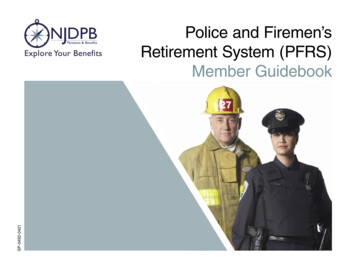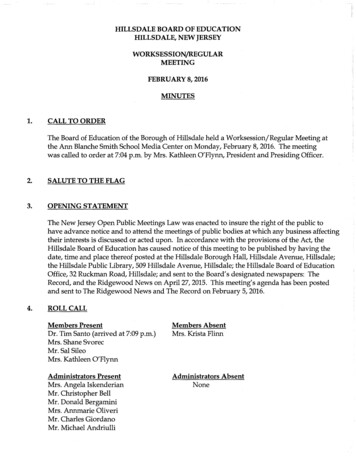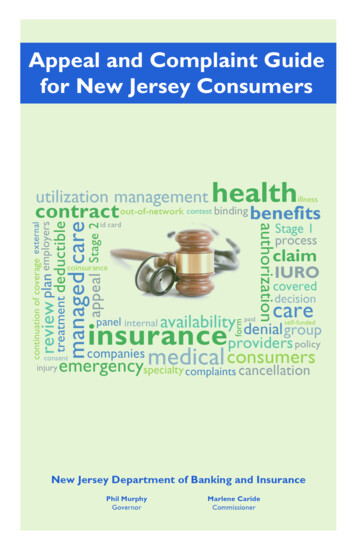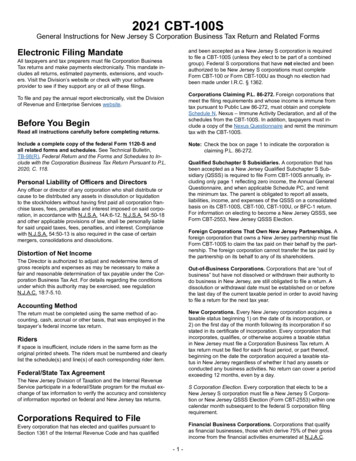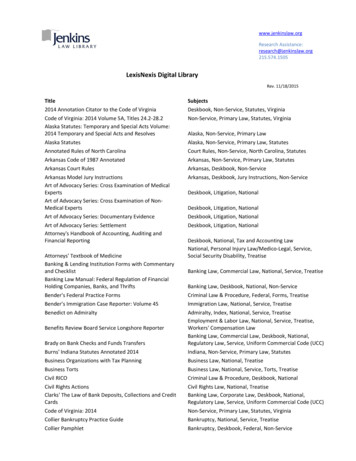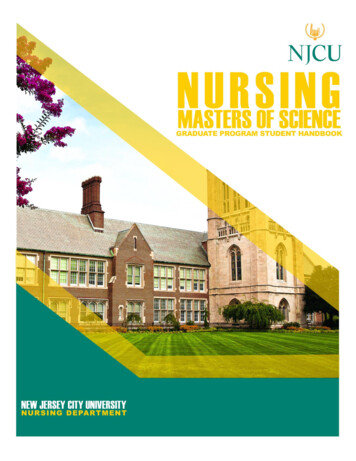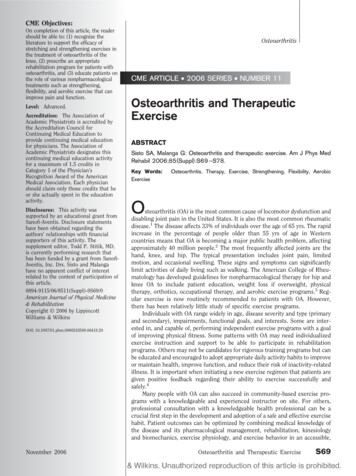
Transcription
New Jersey School Nursing:Nursing :Challenges and Opportunities inPromoting the Health and Wellness ofYouth in New JerseyFocus group outcomes supported by researchDeveloped for New Jersey Health Initiatives (NJHI)by Center for Supportive Schools (CSS)Erin O’Leary, Senior Director, CSSNadia Carofalo, Research Manager, CSSAbby Attias, PhD, Vice President, CSS911 Commons WayPrinceton, New Jersey 08540Tel: 609.252.9300Fax: veschools.org
New Jersey School Nursing:Nursing:Challenges and Opportunities in Promoting theHealth and Wellness of Youth in New JerseyFocus group outcomes supported by researchTable of Contents Executive Summary . . . 1 Focus Group Participants . . . 1 Methodology . . . 2 New Jersey School Nursing:Nursing: Challenges and Opportunitiesin Promoting the Health and Wellness of Youth in NewJersey . . . . 4o THEME 1: New Jersey Department of Education(NJDOE)’s school nursing requirements and thethe inclusionof school nurses on NJDOE staff have helped createpositive statewide conditions for highhigh - quality schoolhealthcare . 4o THEME 2: School nurses can help to build the capacity ofstaff and students to support certain acute healthcareneeds and this additional capacity helps to create a saferand healthier environment for all students in a building . 5o THEME 3: School nurses are underutilized resources forproviding necessary health education to school staff tobridge the current gap between health and education . 7o THEME 4: School nurses represent a “hidden health caresystem” for youth, often serving as the primary healthcare provider for children and families (particularly thosewho are underserved) as well as a resource for childrenand families’ healthcare information . 7o THEME 5: School nursing is currently primarily focusedon specific interventions for students with health issues,but students and schools would benefit greatly if schoolCENTER FOR SUPPORTIVE SCHOOLS
NEW JERSEY S CHOOL NURSING:Challenges and Opportunities in Promoting the Health and Wellness of Youth in New Jerseynurses were able to play a greater role in preventioninitiativesinitiatives . 8o THEME 6: Despite all the roles that school nurses alreadyplay and can play to a fuller extent once validated andsupported, the education community at large does notclearly understand the multimulti- faceted role – and the fullpotential of the role – of school nurses . 8o THEME 7: Improved data about school nursing is criticalfor making improvements in service levels and servicequality . 9o THEME 8: New Jersey could learn from other states thathave developed ways for school nurses to have accessto student health records outside of the school system,which provide better data and thus create the conditionsfor more effective service to students . 10o THEME 9: Identifying students with mental health needsand getting them services is often a challenge . 10o THEME 10: School nurses would greatly benefit fromcultural competency training, as well as training to equipthem with skills and resources to overcome languagebarriers .11o THEME 11: Creating an infrastructure of resources andsupport for school nursing that links the New JerseyDepartment of Health (NJDOH) with the NJDOE mayaddress some of the current challenges in the fieldacross the state .11 References . . . 13CENTER FOR SUPPORTIVE SCHOOLS
NEW JERSEY S CHOOL NURSING:Challenges and Opportunities in Promoting the Health and Wellness of Youth in New JerseyExecutive SummaryFocus group outcomes and research in the literature support the conclusion that New Jerseyhas created many positive conditions to support school nurses in effectively supportinghealth care for students, but significant opportunities remain to advance the field andimprove quality of care. Two opportunities in particular stand out, as follows: Developing additional school nursing infrastructure, such as centralized data systems andadditional qualified oversight roles, could represent opportunities to standardize andimprove school nursing practice statewide. Greater inclusion of school nurses in school and district leadership teams would bring auniquely qualified perspective to dialogue and action focused on improving students’educational outcomes and better connecting schools with families and the larger schoolcommunity.Focus Group ParticipantsThe findings in this paper are grounded in the insights of focus group and interviewparticipants. Center for Supportive Schools (CSS) conducted additional research based onthe insights and the issues identified by the professionals listed below. We thank each one ofthem for their generous contributions and their daily commitment to the health of NewJersey’s young people. Mary Anne Bacon, MSN, RN, NCSN, New Jersey State School Nurses Association(NJSSNA) President and School Nurse at Rancocas Valley High School Mary Blackborow, RN, BSN, MSN, National Association of School Nurses (NASN)Director Sheila Caldwell, RN, BSN, CSN, School Nurse for Matawan Aberdeen Regional SchoolDistrict, NASN SCHLRN-L Community Monitor Lorraine Chewey, MS, RN, New Jersey City University, Coordinator, School NurseCertificate Program Christene DeWitt-Parker, MSN, CSN, RN, New Jersey Department of Education(NJDOE) Coordinator, School Health Unit Marie Foley, PhD, RN, CNL, Acting Dean at the College of Nursing, Seton HallUniversity Tommie Lou Judson, M.Ed., RN, NCSN, NJSSNA Linda Morse, RN, MA, NJ-CSN, CHES, FASHA, President American School HealthAssociation Laura Rothschild, PsyD, CPS, Director of Education and Training, Center for AlcoholStudies, Rutgers University – Coordinator of School Health Leadership ProgramCENTER FOR SUPPORTIVE SCHOOLS1
NEW JERSEY S CHOOL NURSING:Challenges and Opportunities in Promoting the Health and Wellness of Youth in New Jersey 2Anna Tupe, RN, NJ-CSN, President-Elect of the NJSSNA and a School Nurse atLinwood MiddleMethodologyDuring June/July 2014, Center for Supportive Schools (CSS) reached out to school nursesand related health professionals across the state, yielding a group of 10 professionals whoparticipated in a focus group held on July 17, 2014. Two individuals who were unable toparticipate in the focus group were interviewed over the phone. During both the focus groupand phone interviews, the following questions were discussed, using the Center for DiseaseControl and Prevention’s (CDC’s) Coordinated School Health Model as a guidingframework:1. How does your particular role connect to the world of school nursing in New Jersey?From where you sit, what is one area of greatest progress and success within whichNew Jersey’s school nurses are effectively promoting the health and well-being ofyouth?2. Within the areas we’ve deemed as making good progress, what are examples ofspecific school nursing initiatives or programs that you would say are successful?What are the elements that you think are helping these particular initiatives to achievesuccess?3. What are the top three challenges you experience in your role?4. In what ways does New Jersey effectively support school nurses in accomplishingimportant work for youth?5. In what ways does New Jersey provide challenges for school nurses in accomplishingimportant work for youth? What do you see as the causes or roots of these challenges?a. What are ways you think these challenges can and/or should be addressed?b. What are initiatives or strategies that you or others have used to try to addressthese challenges?c. In what ways were these initiatives or strategies successful and/or unsuccessful?d. What can we learn from them?6. If you were to reimagine the role of the school nurse, what would that role look liketo most effectively promote the health and well-being of youth?7. If you were to reimagine the structures for supporting school nurses in New Jersey,what might you put into place?8. Where do you see the greatest current needs and/or opportunities, when it comes topromoting the importance of school nurses in their support of youth health? What dopeople need to know about school nursing?9. Are there any areas that you see as possible “quick-wins” in the field of school nursingthat are currently being overlooked?CENTER FOR SUPPORTIVE SCHOOLS
NEW JERSEY S CHOOL NURSING:Challenges and Opportunities in Promoting the Health and Wellness of Youth in New Jersey10. What do you see as the most useful role for philanthropy to play in supporting thefield of school nursing and its ability to support the health and well-being of youth?As described above, based on the issues and insights identified by focus group and interviewparticipants, CSS conducted additional research to establish deeper context.CENTER FOR SUPPORTIVE SCHOOLS3
NEW JERSEY S CHOOL NURSING:Challenges and Opportunities in Promoting the Health and Wellness of Youth in New Jersey4New Jersey School Nursing:Nursing:Challenges and Opportunities in Promoting theHealth and Wellness of Youth in New JerseyFocus group outcomes supported by researchBelow is a series of themes and insights that represent a snapshot of focus group participants’perceived challenges in and opportunities for promoting the health and wellness of youth inNew Jersey. Incorporated into and supporting one of these themes are two case studies thatdemonstrate that particular theme in action, inclusive of successes, challenges, andcontinuing opportunities for improvement.THEME 1. New Jersey Department of Education (NJDOE)’s school nursingrequirements and the inclusion of school nurses on NJDOE staff have helpedcreate positive statewide conditions for high-quality school healthcare.Unlike many states with much lower ratios, New Jersey requires one certified school nurseper district, creating a greater opportunity for school nurses to have a strong impact inschools. School nurse certification requires nurses to have a bachelor’s degree, a prescribed setof health courses, and instructional experience. These requirements yield highly qualified andeducated school nurses who have been integral in making general education environmentsinclusive for students with chronic conditions and bringing their expertise to bear on a hostof other health-related issues. Further, in New Jersey, school nurses operate as NJDOEemployees, leveraging the same salary scale and benefits as teaching staff, which attractsnurses to the profession and encourages them to earn advanced degrees as they move up thescale. Many New Jersey nurses earn a master’s degree in public health, which provides themwith prevention and disease management training to approach their work with a publichealth management perspective. School nurses also have significant participation inprofessional communities, such as the New Jersey State School Nurses Association(NJSSNA), where they continue their professional development and learning. The increasedaccess to information provided through such professional organizations has been critical tonurses and leadership to continue learning about new developments and best practiceresearch in the field.Still, school nurses experience a dearth of opportunities in the realm of school-basedprofessional development and support. While school nurses, similar to all school staff, arerequired to have a minimum number of hours of professional development each year, schoolsoften cannot afford to have custom professional development relevant to only the schoolnurse separate from the rest of their staff. This situation has often resulted in school nursessitting in on professional development sessions that pertain to academic teaching and aremostly irrelevant for their professional development as school nurses. ProfessionalCENTER FOR SUPPORTIVE SCHOOLS
NEW JERSEY S CHOOL NURSING:Challenges and Opportunities in Promoting the Health and Wellness of Youth in New Jersey5development provided for multiple school nurses within a district or region could represent acost-effective way for schools to provide more relevant and useful professional developmentfor school nurses that complies with NJDOE requirements.Representative Focus Group Quotes “We are fortunate to have one certified school nurse per district mandated. Itgives school nurses a greater opportunity to make a personal impact on schools.” “In New Jersey, there is a community network of school nurses that has formed.” “Highly qualified nurses and the ratio of school nurses to students allow studentswith health issues to come back to their home school district with proper attentionand care.”THEME 2. School nurses can help to build the capacity of staff and students tosupport certain acute healthcare needs and this additional capacity helps to createa safer and healthier environment for all students in a building.Nurses have become more open to delegation of permissions in delivering certain kinds ofhealthcare. By educating other school staff in how to effectively respond to medicalemergencies, schools are no longer reliant on the presence of one school nurse to providemedically necessary interventions in emergency situations. Such involvement of trainedschool staff in emergency situations has already resulted in several students’ lives being saved.Identifying ways for school nurses to further expand the knowledge and skills of school staffto respond to acute student medical needs could represent an opportunity to provideimproved healthcare for all students. CASE STUDY 1 re: Staff Healthcare Capacity: Automated External Defibrillators (AEDs).On September 19, 2012, Governor Chris Christie signed into law P.L. 2012, c. 51. Thislaw, commonly referred to as "Janet’s Law," requires public and nonpublic schools to haveautomated external defibrillators and to establish emergency action plans for responding tosudden cardiac events, effective September 1, 2014. No less than five school faculty membersat each school must successfully complete and hold a current certification in cardiopulmonary resuscitation (CPR) and the use of a defibrillator from the American Red Cross,American Heart Association, or other training program recognized by the New JerseyDepartment of Health. One of these trained individuals must be present at all school athleticevents with an AED no more than 90 seconds distance away from the event. Since thepassing of the law, there have already been a few instances in New Jersey where students havesuffered a cardiac event during a school athletic event and were saved by a trained schoolemployee using an AED. Three school nurses – Sheila Caldwell, RN, BSN, CSN-NJ;CENTER FOR SUPPORTIVE SCHOOLS
NEW JERSEY S CHOOL NURSING:Challenges and Opportunities in Promoting the Health and Wellness of Youth in New Jersey6Wendy Lamparelli, RN, NJ-CSN, M. Ed.; and Dawn Tortejada, RN, MSN, PNP-BC –realized that school nurses needed to be educated about the law and have been providing freeworkshops for the school nurses of New Jersey over the past year. Through these workshops,they are equipping school nurses to understand the law and their role in supporting theirschool in the implementation of the law. This team of three has reached well over 600 ofNew Jersey’s school nurses.1 CASE STUDY 2 re: Staff Healthcare Capacity: Epinephrine pens (EPI pens).Approximately one in every 13 children under 18 years of age has a food allergy, which is2roughly two students in every classroom in the U.S. According to a study released in 2013by the Centers for Disease Control and Prevention, food allergies among children increasedapproximately 50% between 1997 and 2011. Centers for Disease Control also reports thatfood allergies result in more than 300,000 ambulatory-care visits a year among childrenunder the age of 18, with teenagers and young adults with food allergies at the highest risk offatal food-induced anaphylaxis. New Jersey laws allow students with necessary prescriptionsand parental and physician consent to be administered epinephrine by a school nurse orother trained designee in cases of emergency. New Jersey guidelines require school nurses toprovide annual training to delegated school personnel on the emergency administration ofepinephrine via an auto-injector.3 In addition, federal legislation called the School Access toEmergency Epinephrine Act, passed in November 2013, gives states a financial incentive forpassing legislation requiring that schools have epinephrine on hand and personnel trained inhow to administer it to any student believed to be having an anaphylactic reaction. New4Jersey is in the process of passing such legislation. This new legislation could represent anopportunity for school nurses to expand their role educating and training school staff toappropriately identify situations in which an EPI pen is needed and to safely access andadminister the medication.Representative Focus Group Quotes “School nurses are open to delegation to create an effective balance to take care ofstudents’ health.” “Equipping staff and students with greater capacity and skills to respond inemergency health situations makes the school environment better for every studentin the building, whether they have an identified health issue or 014/05/arming school nurses for j.us/2014/Bills/A0500/304 I1.PDF2CENTER FOR SUPPORTIVE SCHOOLS
NEW JERSEY S CHOOL NURSING:Challenges and Opportunities in Promoting the Health and Wellness of Youth in New Jersey7THEME 3. School nurses are underutilized resources for providing necessaryhealth education to school staff to bridge the current gap between health andeducation.Teachers generally do not receive substantial training about student health, and instructionalexpectations generally do not encourage teachers to incorporate health and wellness practicesor content into their academic classes. Though New Jersey has been able to implement theCoordinated School Health model established by the CDC in certain schools throughout thestate, the model is not effectively integrated into all schools state-wide. School nurses are aunique resource, both medically trained and (if certified) trained as instructors, for providingthis kind of health education for school staff. As the only medical professionals in mostschool buildings, school nurses are uniquely positioned to support new health initiatives.Specifically, school nurses can play an important role assessing and bolstering educators’current health knowledge, developing models for effectively training school staff about healtheducation, and collaborating with educators to identify effective ways to incorporate healtheducation into academic content.Representative Focus Group Quote “Health is not a focus for teachers, though it should be. School nurses could potentiallyplay a leadership role in providing health education for teachers and students. Theyare often the only licensed medical professional in a school building.”THEME 4. School nurses represent a “hidden health care system” for youth, oftenserving as the primary health care provider for children and families (particularlythose who are underserved) as well as a resource for children and families’healthcare information.School nurses are accessible by all students and are often the one point of connection with aschool that all families (particularly those in underserved communities) will respond to andinteract with. For example, undocumented families who may not engage with other schoolfaculty and staff will still talk to a school nurse. According to the Gallup poll, since 2005,more than 80% of Americans have rated nurses as having "high" or "very high" honesty andethical standards. Nurses have topped the list since 1999 with little exception.5 This publicperception helps school nurses to be uniquely positioned to play a pivotal role in engagingfamilies and communities. Opportunity may exist in more formally acknowledging andsupporting this important role of school nurses to serve as liaisons and advocates forconnecting students and families with specific community y-ethics-rating-clergy-slides-new-low.aspxCENTER FOR SUPPORTIVE SCHOOLS
NEW JERSEY S CHOOL NURSING:Challenges and Opportunities in Promoting the Health and Wellness of Youth in New Jersey8Representative Focus Group Quotes “Nurses embrace what they need to do to improve safety in and outside the schoolcommunity.” “School nurses have been a hidden healthcare system for children for years,particularly for children with the most needs. Families feel greater security dealingwith a school nurse.”THEME 5. School nursing is currently primarily focused on specific interventionsfor students with health issues, but students and schools would benefit greatly ifschool nurses were able to play a greater role in prevention initiatives.An abundance of research connects health and educational outcomes. School nurses wouldbenefit from learning how to leverage this connection in their work so they can think andwork collaboratively with school and district leadership from a prevention perspective. Suchcollaboration would also help to evolve perception of their role from “handing out bandaids” and putting out medical fires to more widely acknowledged educators who contributeto the mission of schools.Representative Focus Group Quotes “Many school nurses are progressing from handing out band aids to thinking witha prevention perspective. Rather than responding to fires, school nurses should beallowed to also operate with a 30,000 foot view.” “A shift to focus on prevention undergirds everything we want to achieve for ourchildren’s and communities’ health.”THEME 6. Despite all the roles that school nurses already play and can play to afuller extent once validated and supported, the education community at large doesnot clearly understand the multi-faceted role – and the full potential of the role –of school nurses.Many teachers and administrators are unaware of the comprehensive role and training of theschool nurse and typically only turn to school nurses to address medical emergencies or otherhealth situations. Education and communication strategies may help to promote theimportance of the role of school nurses within and beyond schools. Further, requiring orCENTER FOR SUPPORTIVE SCHOOLS
NEW JERSEY S CHOOL NURSING:Challenges and Opportunities in Promoting the Health and Wellness of Youth in New Jersey9recommending the participation of school nurses in regular leadership meetings at the schooland district levels may be one way to support further recognition of school nurses as healthexperts and open up dialogue to promote greater understanding and support of the role ofschool nurses.Representative Focus Group Quote “School nurses’ roles should be transformed to be at the frontlines as communityhealth leaders in implementing the coordinated school health model. Schoolnurses should chair wellness committees, be a part of the principal’s cabinet, etc.”THEME 7. Improved data about school nursing is critical for makingimprovements in service levels and service quality.A Nursing Services Plan is required each year for each district board of education, and this6Plan is submitted to the county superintendent for review and approval. Though submittedplans may warrant changes to nursing staffing levels, action is sometimes not taken at thelocal level to support adequate resource allocation across a district or within a particularschool. Though student acuity levels change from year to year, and there is a welldocumented relationship between adequate nurse-to-student ratios and student outcomes,there remains a gap in monitoring and addressing changing local needs from year to year.Further, such information remains at a local level. There is currently not a centralized way tocollect and address school nursing data and needs comprehensively state-wide. A centralizeddatabase designed to collect school nursing data could be one way to provide criticalinformation to assess acuity levels and serve as an important method for determining themost commonly used and effective interventions and practices for supporting the health andwell-being of youth across the state. Additional statewide oversight to ensure appropriateresource allocation and staffing levels each year may also further benefit student health andthe ability of school nurses to effectively support student health.Representative Focus Group Quote “We need school nurse specific data. We don’t know how many we have, we don’thave a place to find this information, and any existing databases are often unreliable.This type of database could flourish into collecting the types of interventions mostcommonly used, dispositions, fs/bullying/programstosupportstudent.pdfCENTER FOR SUPPORTIVE SCHOOLS
NEW JERSEY S CHOOL NURSING:Challenges and Opportunities in Promoting the Health and Wellness of Youth in New Jersey10THEME 8. New Jersey could learn from other states that have developed ways forschool nurses to have access to student health records outside of the school system,which provide better data and thus create the conditions for more effective serviceto students.School nurses do not always have the most updated information about students’ health andmust get permission from parents to communicate with a child’s doctor. Once school nursesreceive a care plan for a child, they must rely on the doctor and/or the child’s parents to beinformed of updates or changes; however, this information is often not provided or isprovided in an untimely manner. In 2011, School nurses in Delaware voiced these concernsto administrators at Nemours Children’s Health System, which serves residents across thestate. As a result, the health system collaborated with the Delaware School NursesAssociation and the State Department of Education to develop a program that, with parentalapproval, now gives school nurses read-only access to the electronic health records of morethan 1,500 students who have complex medical conditions or special needs such as diabetes,asthma, attention deficit hyperactivity disorder, seizure disorders or gastrointestinal7problems. New Jersey may benefit from a similar program that ensures access to more timelyand accurate information for school nurses, who can then provide more comprehensive andconnected healthcare for students.Representative Focus Group Quote “What is important, right now in schools, is if a parent doesn’t give permission totalk to a child’s doctor, school nurses only have second- or third-hand informationabout that child’s care. Creating better access to first-hand data would help schoolnurses work more effectively as a member of a child’s health care team.”THEME 9. Identifying students with mental health needs and getting themservices is often a challenge.Student health needs are not always physically obvious, and even when mental health needsare identified, it is also a challenge to identify appropriate services that are available to meetthese needs. School nurses could benefit from additional mental health training and supportresources to ensure students’ mental health needs are identified and addressed edical-records-improvescareCENTER FOR SUPPORTIVE SCHOOLS
NEW JERSEY S CHOOL NURSING:Challenges and Opportunities in Promoting the Health and Wellness of Youth in New Jersey11Representative Focus Group Quote “Identifying students with mental health services and getting services for them isa challenge because it’s not always obvious to a school nurse whether an issue isphysical or mental, especially when students present, for example, with chronicheadaches and stomachaches.”THEME 10. School nurses would greatly benefit from cultural competencytraining, as well as training to equip them with skills and resources to overcomelanguage barriers.Populations across New Jersey are changing to become more diverse. For example, RobertMontemayor, Director of Rutgers’ Latino Information Network, a program that looks tomake reference materials about Hispanic lif
Certificate Program Christene DeWitt-Parker, MSN, CSN, RN, New Jersey Department of Education (NJDOE) Coordinator, School Health Unit Marie Foley, PhD, RN, CNL, Acting Dean at the College of Nursing, Seton Hall University Tommie Lou Judson, M.Ed., RN, NCSN, NJSSNA
